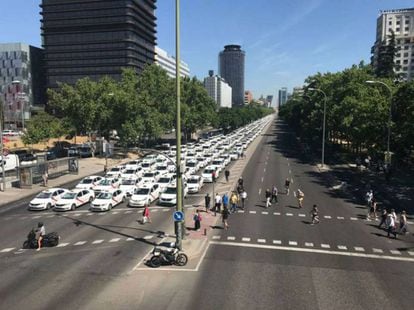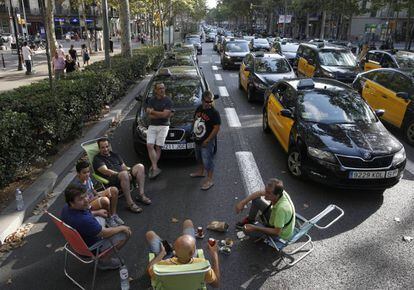Taxi strikes to continue across Spain after talks with government fail
Government offer to transfer licensing powers to regional authorities will only extend the problem to 17 regions, say taxi representatives

The taxi strikes will continue across Spain after sector representatives failed to reach a deal with government officials at a four-hour meeting on Monday.
Taxi representatives said they are not satisfied with the government’s offer to transfer powers over licensing to regional governments, and said this would simply extend the problem to 17 regions, rather than fix it.
People have been contained until now. Today things could get more aggressive
Daniel Carrasco, taxi driver
The Popular Party (PP) and Ciudadanos said they will ask Public Works Minister José Luis Ábalos to come to Congress to explain the “chaos” caused by the stoppage, which comes at the peak of tourist season in Spain.
Spanish authorities this week launched a series of meetings in a bid to end the ongoing strikes in Barcelona, Madrid and other cities over “unfair” competition from ride-hailing services like Uber or Cabify.

Thousands of passengers and tourists have felt the effects of the strikes, which come in the middle of peak tourist season in Spain. Taxi representatives said that they hope for a better proposal when they go back into the Public Works Ministry this afternoon to resume talks. After that, it will be up to taxi sector assemblies to decide whether the ongoing nationwide strikes are called off or not.
On Wednesday of last week, protests turned violent when some strikers surrounded and kicked Uber and Cabify vehicles operating in the streets of the Catalan capital. In one instance, protesters accosted a vehicle carrying a family and pushed the driver around. Unauto, the association representing ride-hailing companies, has reported these and other incidents.

On Monday Pedro Saura, the state secretary for infrastructure, transportation and housing, met with Spain’s main sector associations – Fedetaxi, Élite Taxi and Antaxi – to listen to their demands.
On Tuesday Saura is set to meet representatives of ride-hailing associations, who operate under special licenses for chauffeured rental vehicles known as VTC. “Tomorrow we’re going to ask the government not to yield to the blackmail, because we cannot renounce competition, because competition is good. And because blackmail is not good,” said Eduardo Martín, president of Unauto, which represents VTC interests.
Taxi representatives said that Saura was sympathetic to their concerns and that he wants to see an enforcement of the law, which says that only one VTC license can be awarded for every 30 taxi licenses.
Violence
We need to defend the taxi as a public service against the attacks from the financial vultures
Rafael Mayoral, Podemos
On Wednesday of last week, protests turned violent when some strikers surrounded and kicked Uber and Cabify vehicles operating in the streets of the Catalan capital. In one instance, protesters accosted a vehicle carrying a family and pushed the driver around. Unauto, the association representing ride-hailing companies, has reported these and other incidents.
And this could be a taste of more things to come. On Monday, a Madrid taxi driver named Daniel Carrasco said that “people have been contained until now. Today, depending on the outcome of the meeting, things could get more aggressive.”
Some drivers of ride-hailing services said they have colleagues who have decided to stay home rather than risk damage to their vehicles or personal assault. “They have the right to strike and demand what they feel to be their rights, but without getting violent against us,” said Abdel Ghani, an Uber driver who says his car was pelted with eggs on Madrid’s O’Donnell street late Friday night.
The Public Works Ministry has also rescheduled the National Transportation Conference, which was going to be held in September but will now take place on Wednesday. At this gathering, the government will propose granting regional authorities the powers to award new VTC licenses.

The ministry called for “calm” over the weekend and said taxi associations in Barcelona and Madrid must return to normality as a “necessary step” towards a joint solution that will facilitate a “balanced coexistence” between taxis and ride-sharing services.
Indefinite strike
The conflict began on Wednesday of last week when Barcelona taxi drivers announced a two-day strike to support a city ordinance, approved on the initiative of Mayor Ada Colau, that limited the scope of action for companies like Uber and Cabify. This regulation has been temporarily placed on hold by the Superior Court of Justice of Catalonia (TSJC), which feels that it encroaches on national powers over transportation issues.
After that decision by the regional high court, taxi drivers in Barcelona began an indefinite strike on Saturday, July 28, which was soon seconded by Madrid drivers. The protest has since extended to other parts of Spain such as Málaga, Sevilla, Valencia, Alicante, Zaragoza and La Rioja, where the stoppage will remain in force until Tuesday of this week.
In Barcelona, taxi drivers also blocked traffic in the city center and on access roads to the airport. Their colleagues in Madrid followed suit and walked out of Barajas airport and the Atocha train station.
The confrontation has become political as well. José Alberto Herrero, a national deputy for the conservative Popular Party (PP), has accused the Socialist (PSOE) government of “yielding to separatists’ blackmail and leaving the taxi and VTC sectors defenseless.” According to Herrero, “the Public Works Ministry has given up on defending state powers against the radical administration of Ada Colau.”
The Catalan premier, Quim Torra, has asked taxi drivers to prioritize “safety and responsibility” and encouraged “greater involvement by all parties in this conflict.”
Rafael Mayoral, an official with the leftist party Podemos, showed support for the taxi sector because “we need to defend the taxi as a public service against the attacks from the financial vultures.”
English version by Susana Urra.












































